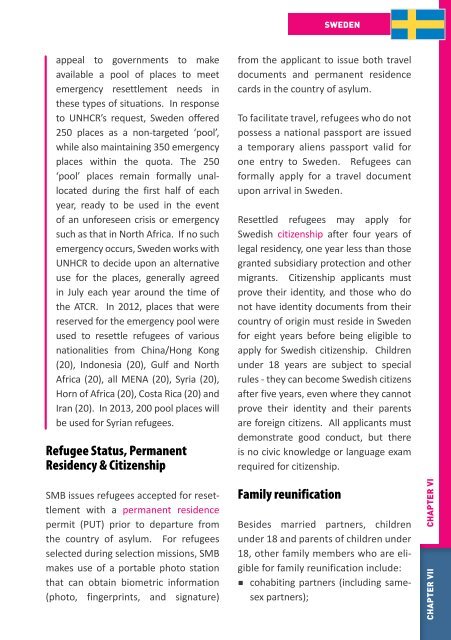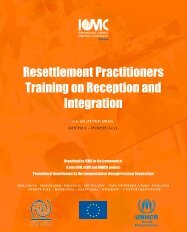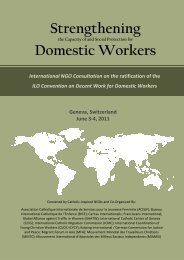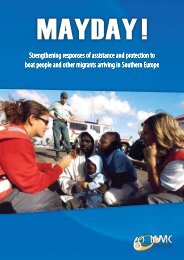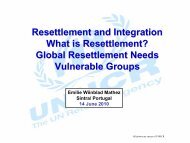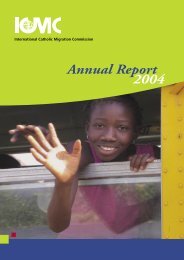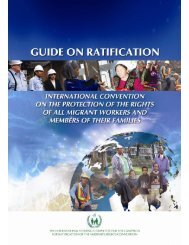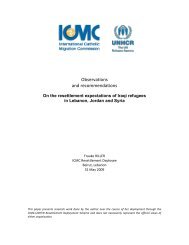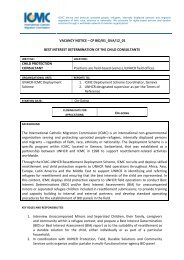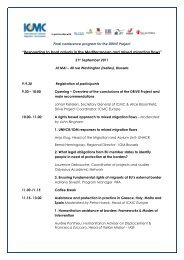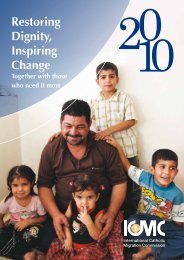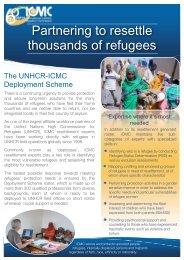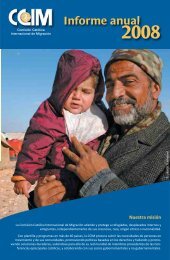ICMCEUROPE WelcometoEurope.pdf (5.89 MB)
ICMCEUROPE WelcometoEurope.pdf (5.89 MB)
ICMCEUROPE WelcometoEurope.pdf (5.89 MB)
You also want an ePaper? Increase the reach of your titles
YUMPU automatically turns print PDFs into web optimized ePapers that Google loves.
Sweden<br />
appeal to governments to make<br />
available a pool of places to meet<br />
emergency resettlement needs in<br />
these types of situations. In response<br />
to UNHCR’s request, Sweden offered<br />
250 places as a non-targeted ‘pool’,<br />
while also maintaining 350 emergency<br />
places within the quota. The 250<br />
‘pool’ places remain formally unallocated<br />
during the first half of each<br />
year, ready to be used in the event<br />
of an unforeseen crisis or emergency<br />
such as that in North Africa. If no such<br />
emergency occurs, Sweden works with<br />
UNHCR to decide upon an alternative<br />
use for the places, generally agreed<br />
in July each year around the time of<br />
the ATCR. In 2012, places that were<br />
reserved for the emergency pool were<br />
used to resettle refugees of various<br />
nationalities from China/Hong Kong<br />
(20), Indonesia (20), Gulf and North<br />
Africa (20), all MENA (20), Syria (20),<br />
Horn of Africa (20), Costa Rica (20) and<br />
Iran (20). In 2013, 200 pool places will<br />
be used for Syrian refugees.<br />
Refugee Status, Permanent<br />
Residency & Citizenship<br />
from the applicant to issue both travel<br />
documents and permanent residence<br />
cards in the country of asylum.<br />
To facilitate travel, refugees who do not<br />
possess a national passport are issued<br />
a temporary aliens passport valid for<br />
one entry to Sweden. Refugees can<br />
formally apply for a travel document<br />
upon arrival in Sweden.<br />
Resettled refugees may apply for<br />
Swedish citizenship after four years of<br />
legal residency, one year less than those<br />
granted subsidiary protection and other<br />
migrants. Citizenship applicants must<br />
prove their identity, and those who do<br />
not have identity documents from their<br />
country of origin must reside in Sweden<br />
for eight years before being eligible to<br />
apply for Swedish citizenship. Children<br />
under 18 years are subject to special<br />
rules - they can become Swedish citizens<br />
after five years, even where they cannot<br />
prove their identity and their parents<br />
are foreign citizens. All applicants must<br />
demonstrate good conduct, but there<br />
is no civic knowledge or language exam<br />
required for citizenship.<br />
S<strong>MB</strong> issues refugees accepted for resettlement<br />
with a permanent residence<br />
permit (PUT) prior to departure from<br />
the country of asylum. For refugees<br />
selected during selection missions, S<strong>MB</strong><br />
makes use of a portable photo station<br />
that can obtain biometric information<br />
(photo, fingerprints, and signature)<br />
Family reunification<br />
Besides married partners, children<br />
under 18 and parents of children under<br />
18, other family members who are eligible<br />
for family reunification include:<br />
• cohabiting partners (including samesex<br />
partners);<br />
CHAPTER VI<br />
CHAPTER VII


